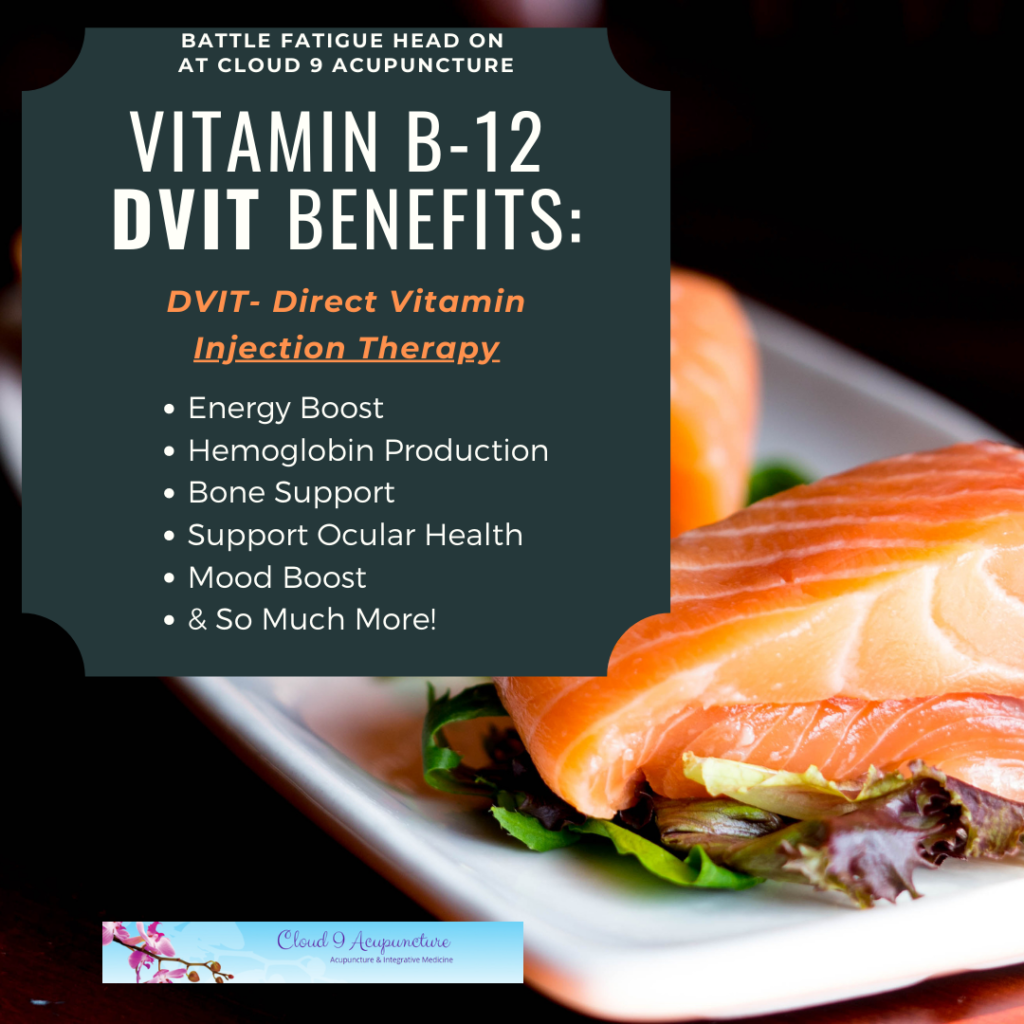
Did You Know? . . .
Cloud 9 offers Vit. B-12 Injections.
From http://peripheralneuropathycenter.uchicago.edu/learnaboutpn/typesofpn/systemic/nutrition.shtml
“VITAMIN B12 DEFICIENCY
Vitamin B12 is an essential dietary nutrient—a B12 deficiency can lead to a number of serious conditions including peripheral neuropathy.
Vitamin B12 deficiency is common in the United States, especially among the elderly. It is estimated that between 10% and 25% of the people over 80 years of age may have a B12 deficiency. There are several causes of B12 deficiency. A strict vegetarian diet may promote a B12 deficiency because animal-based foods such as red meat, dairy products, fish, poultry and eggs are the only recognized source of dietary B12. A lack of B12, or the inability of stomach acids to aid in the absorption, also causes this deficiency. Consequently, drugs that reduce stomach acid should be taken with B12 supplements. A number of other conditions, procedures, and drugs are associated with a reduced the ability to absorb B12. These include autoimmune diseases, pernicious or unexplained anemia, pancreatic diseases, ileal resection, Crohn’s disease, HIV infection, gastritis, gastric or small intestine surgeries, malabsorption syndromes, multiple sclerosis, and use of histamine2 receptor antagonists or proton pump inhibitors.
A lack of vitamin B12 can cause serious anemia, nerve damage and degeneration of the spinal cord. It is common for anemia to develop first, but this is not always the case, especially if a person is taking a folate supplement. A lack of B12 damages the myelin sheath that surrounds and protect nerves. Without this protection, nerves cease to function properly and conditions such as peripheral neuropathy occur. Even B12 deficiency that is relatively mild may affect the nervous system and the proper functioning of the brain. The nerve damage caused by a lack of B12 may become permanently debilitating, if the underlying condition is not treated.
SYMPTOMS AND SIGNS
(Not all symptoms and signs may be present.)
- Lack of coordination
- Pain, numbness, and tingling in hands or feet
- Sensory loss
- Weakness”
Additionally, . . .
According to the Mayo Clinic, “Vitamin B-12 (cobalamin) is a water-soluble vitamin that plays essential roles in red blood cell formation, cell metabolism, nerve function and the production of DNA.
…
Left untreated, a vitamin B-12 deficiency can lead to anemia, fatigue, muscle weakness, intestinal problems, nerve damage and mood disturbances.
The recommended daily amount of vitamin B-12 for adults is 2.4 micrograms.
Evidence:
Research on the use of vitamin B-12 for specific activities and conditions shows:
- Heart and blood vessel disease. Vitamin B-12, in combination with vitamin B-6 and folate (vitamin B-9), has been shown to control high levels of homocysteine in the blood. Elevated homocysteine might increase your risk of diseases of the heart and blood vessels (cardiovascular disease). Despite this benefit, there’s no evidence to show that vitamin B-12 supplements prevent heart disease.
- Dementia. Vitamin B-12 deficiency is associated with dementia and low cognitive function, but it’s not clear whether vitamin B-12 supplements might help prevent or treat dementia.
- Athletic performance. Unless you have a vitamin B-12 deficiency, there’s no evidence that vitamin B-12 supplements will boost your energy or make you a better athlete.” Referenced from https://www.mayoclinic.org/drugs-supplements-vitamin-b12/art-20363663

